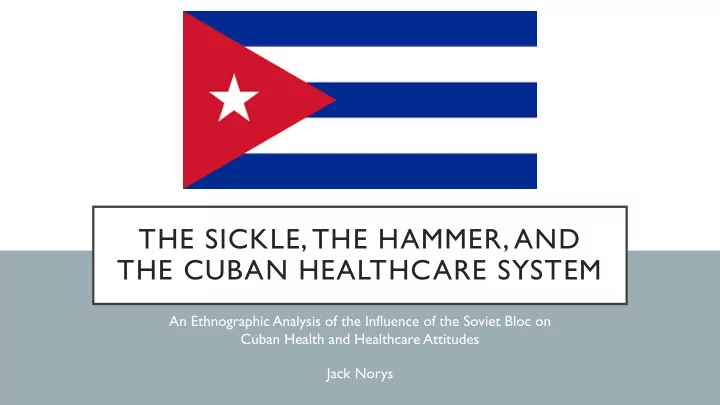

THE SICKLE, THE HAMMER, AND THE CUBAN HEALTHCARE SYSTEM An Ethnographic Analysis of the Influence of the Soviet Bloc on Cuban Health and Healthcare Attitudes Jack Norys
BACKGROUND AND DEMOGRAPHICS OF CUBA
GENERAL OVERVIEW OF CUBA 5 • Island nation located in the Caribbean ~90 miles south of Florida • Communist political system since 1959 Some Quick Health Statistics: • Life expectancy (m/f): 77/81 (US: 76/81) • Population: 11.4 million • Probability of dying under 5: 5 (US: 7) • 11.1% of GDP spent on healthcare (US: 17.1%)
GENERAL OVERVIEW OF CUBA CONT. 3 • Although largely rural most people live in urban areas • Havana is most densely populated (2.1 Million) • Culture based off of African, Amerindian, and Spanish customs • Influence of both Catholicism and Afro- Caribbean practice of Santería
HISTORY OF CUBAN GOVERNMENT 1 • 1952: Fulgencio Batista becomes dictator • 1953: Fidel Castro leads revolution • 1959: Fidel Castro becomes communist leader, many Cubans flee to the United States • 1960: Castro nationalizes all businesses, Cuba becomes part of Soviet Bloc Cuban War for Independence 1898 • 1989: End of Soviet Bloc
THE INFLUENCE OF THE SOVIET BLOC ON CUBAN HEALTHCARE AND HEALTHCARE ATTITUDES
HEALTHCARE SYSTEM PRE-SOVIET ERA CUBA 4 • Mainly modern western biomedicine since 1800’s (some practice of traditional healing) • Health in centralized to cities, rural areas have almost no access • Dependent on other countries like United States • Wealthy had much better access
HEALTHCARE SYSTEM SOVIET ERA CUBA • Following the revolution, healthcare became a main priority of Cuban government • Socialism influences healthcare to be treated as “moral imperative” 2 • Constitution states “Everybody has the right to health protection and care” 4 • Accomplished by creation of the National Health System 2 • Free medical and dental care to all citizens • Illegalized private healthcare
P. SEAN BROTHERTON • Anthropology Professor at University of Chicago • Conducted ethnographic research on health in post-soviet era Cuba • Ethnographic work Revolutionary Medicine details health in Cuba following the collapse of Soviet Bloc
CUBAN HEALTHCARE SYSTEM POST-SOVIET ERA CUBA 2 • Following loss of Soviet subsidies and increase of US embargo, the Cuban government struggled to continue providing top-rate universal healthcare • 1991 Cuban government declared “Período Especial” • Forced Cubans to pursue informal healthcare practices • Introduction of Programa del Médico y la Enfermera de la Familia • Influenced shift in healthcare attitudes, experiences, and narratives
POST-SOVIET ERA HEALTH NARRATIVES AND ATTITUDES
ATTITUDES OF CUBAN PHYSICIANS “Unfortunately, as my friend further pointed out, while some individuals citizens may happily bare their souls without thinking twice, many state professionals, especially physicians, are in a different position. They are more conscious, he suggested, of the way in which open dissent may have negative consequences for their careers, particularly as they work so closely with the government.” 2
CHANGE IN CUBAN HEALTH NARRATIVES “The frequent blackouts, crumbling local transportation system, empty pharmacies, massive lineups for the few basic necessities (those still provided), and the politics of passively watching foreigners enjoy the now-popular socialist resort island and not being able to participate were simply too much for the average person… Cubans had come to expect a certain standard of living similar to that of people in other economically developed countries: Is this not what la Revolucíon was for?” 2
REFERENCES 1. BBC: Cuba profile - Timeline. (2018, May 01). Retrieved from https://www.bbc.com/news/world-latin- america-19576144 2. Brotherton, P . S. (2012). Revolutionary medicine: Health and the body in post-Soviet Cuba . Durham: Duke University Press. 3. Grenier, Y. (2017). Culture and the Cuban State: Participation, recognition, and dissonance under communism . Lanham, MD: Lexington Books. 4. Keck, C. W., & Reed, G. A. (2012). The Curious Case of Cuba. Am J Public Health , 102(8), 13-22. 5. World Health Organization: Cuba. (2019, April 27). Retrieved from https://www.who.int/countries/cub/en/
QUESTIONS?
Recommend
More recommend